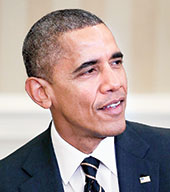
New Delhi, March 20: India and the US have quietly inked an agreement detailing how Washington will track New Delhi's use of American nuclear reactors, two months after President Barack Obama and Prime Minister Narendra Modi declared a "breakthrough" on their long-dormant nuclear pact.
As agreed in the 2008 nuclear deal, the two countries have exchanged signed copies of the "administrative arrangements" - critical before American companies can set up nuclear complexes in India.
The agreed arrangements, signed by India's department of atomic energy and America's department of energy, eliminate the final policy hurdle holding back the implementation of the India-US nuclear deal.
A panel of experts, dubbed a "contact group" by the government and set up during Modi's visit to Washington last September, met yesterday.
"They agreed that there are no more policy hurdles," foreign office spokesperson Syed Akbaruddin said today.
The foreign office refused to reveal details of the "administrative arrangements", especially the process through which Washington will track India's use of US reactors as mandated by American law.
But senior officials familiar with the final agreed text have told The Telegraph that Delhi will share data on its use of the American reactors without actually allowing US officials to inspect Indian nuclear complexes.
The new agreement is in keeping with a practice that India and the US followed with the Tarapur reactors that New Delhi had bought from American firms Bechtel and GE in the 1960s before India first tested nuclear weapons in 1974, the officials said.
Then, as now, US law required the country's department of energy to track the use of nuclear material exported to any country that was not a signatory to the non-proliferation treaty.
Even countries like India, with which the US has inked deals dubbed "123 agreements" allowing nuclear trade, are not exempt from this domestic American requirement.
After the two nations inked their "123 agreement" in 2008, the US had reaffirmed this condition to India on several occasions, officials from both nations had previously confirmed to this correspondent.
But ahead of Obama's visit in January, negotiations over the administrative arrangements had stumbled into difficulties after Washington demanded greater scrutiny of the use of its reactors.
The "contact group", at last-ditch meetings in Geneva and London on the eve of the Obama visit, agreed to broadly repeat the Tarapur arrangement, officials said.
US companies Westinghouse and GE want to set up reactors in India under the 2008 pact. But no American company is allowed to export reactors unless the US government has administrative arrangements with that country.
The Indian negotiators have quietly sidestepped a second potential hurdle too - the absence of a nuclear deal with Japan, whose firm Toshiba is the parent company of the American Westinghouse.
"The absence of civil nuclear cooperation with Japan is currently not an obstacle for cooperation with other partners," Akbaruddin said in response to a question today.
India and the US, officials confirmed, have convinced Japan to insulate India-US nuclear trade from its domestic laws by arguing that while Toshiba is Japanese, its subsidiary Westinghouse remains listed as an American company.
"Once the Japanese realised the India-US complexities had been sorted out, it became easier to convince them," an Indian official aware of the back-channel talks with Japan said.
Representatives from GE, Westinghouse, Toshiba, Japanese funding agencies, and nuclear operators from Russia (Rosatom) and France (Areva) are currently in India, officials said, to negotiate finer details of a government-sponsored insurance pool for nuclear reactors.
The insurance pool, which India had last year proposed to France and Russia, and which the US has now in principle agreed to, will allow foreign nuclear firms to effectively sidestep controversial provisions of India's liability law - legally.
These firms will buy insurance from Indian government insurance agencies, but add the premiums to the cost at which they sell the reactors - also to the Indian government.
The compensation, in the event of an accident, will be covered through a Rs 1,500-crore insurance pool, of which 50 per cent will be contributed by the Indian government directly, and the rest by the public sector insurance firms.










